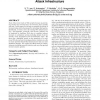Free Online Productivity Tools
i2Speak
i2Symbol
i2OCR
iTex2Img
iWeb2Print
iWeb2Shot
i2Type
iPdf2Split
iPdf2Merge
i2Bopomofo
i2Arabic
i2Style
i2Image
i2PDF
iLatex2Rtf
Sci2ools
104
click to vote
CCS
2006
ACM
2006
ACM
Puppetnets: misusing web browsers as a distributed attack infrastructure
Most of the recent work on Web security focuses on preventing attacks that directly harm the browser's host machine and user. In this paper we attempt to quantify the threat of browsers being indirectly misused for attacking third parties. Specifically, we look at how the existing Web infrastructure (e.g., the languages, protocols, and security policies) can be exploited by malicious Web sites to remotely instruct browsers to orchestrate actions including denial of service attacks, worm propagation and reconnaissance scans. We show that, depending mostly on the popularity of a malicious Web site and user browsing patterns, attackers are able to create powerful botnet-like infrastructures that can cause significant damage. We explore the effectiveness of countermeasures including anomaly detection and more fine-grained browser security policies. Categories and Subject Descriptors D.4.6 [Operating Systems]: Security and Protection--Invasive software General Terms Security, Measurem...
| Added | 20 Aug 2010 |
| Updated | 20 Aug 2010 |
| Type | Conference |
| Year | 2006 |
| Where | CCS |
| Authors | V. T. Lam, Spyros Antonatos, Periklis Akritidis, Kostas G. Anagnostakis |
Comments (0)

